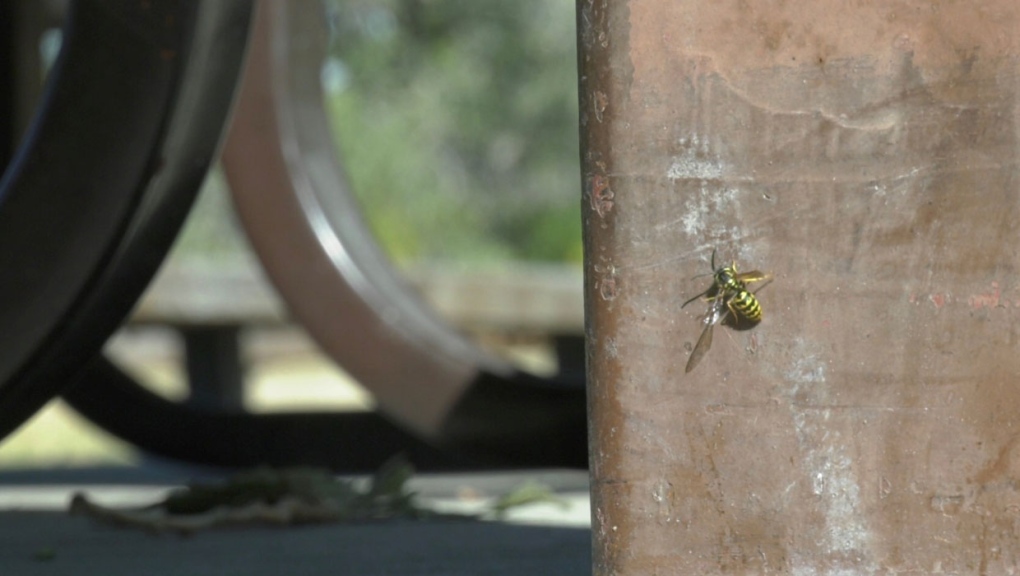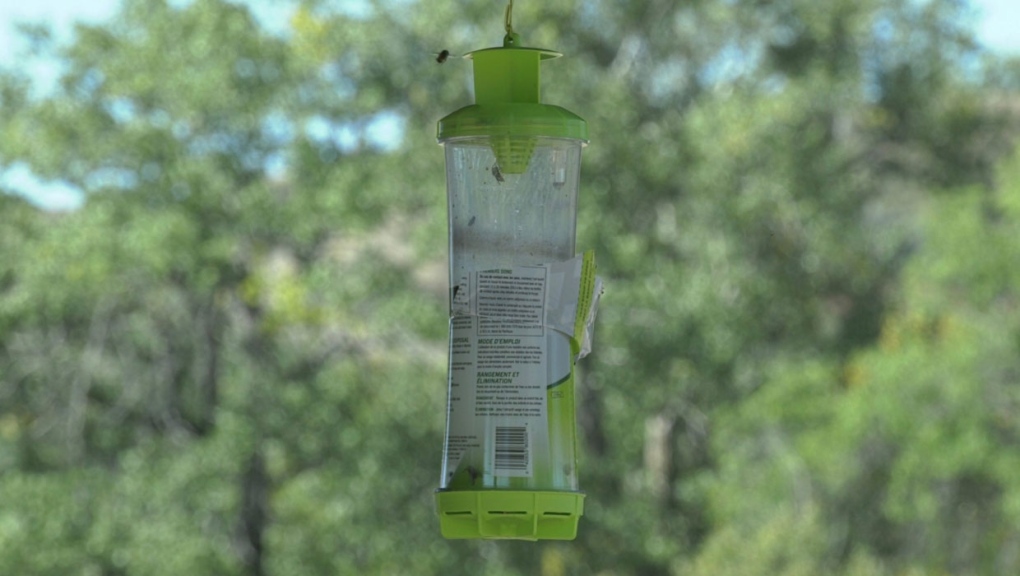Wasp season in Lethbridge seeing average numbers, experts say
 If you're surprised at the number of wasps this time of year, experts say populations are not much higher than average.
If you're surprised at the number of wasps this time of year, experts say populations are not much higher than average.
Wasps and hornets have become a bit of a pain in southern Alberta, especially as the summer winds down.
“This year’s numbers are fairly average with previous years,” said Jessica Deacon-Rogers, program coordinator Helen Schuler Nature Centre.
“So they start out with very few numbers in the spring and throughout the summer their numbers build, build and build,” she said. “So this time of year is when their populations are at a maximum in the colony that they live in and so that's why we're seeing a lot of them at this time of year.”
With a hot August, Deacon-Rogers said that’s resulted in a slight increase of wasps this year.
“We also had a very warm summer and early fall and so often what happens is we start getting those hard, hard frosts and cold, cold weather at the night and they start dying,” Deacon-Rogers said. “So, a lot of the population decreases and because we haven't had a lot of that cool weather yet we still have really high populations of them in all of their colonies.”
Whether out for a stroll, or enjoying a beverage on a patio, wasps seem to be everywhere.
“There have been some patrons that have had to seek shelter inside the restaurants because of the wasps, but we've been fairly fortunate that for the most part we can still use our patio,” said Dawn Lindwall with Telegraph Taphouse.
Lindwall said the wasp activity has increased over the past few weeks, with Telegraph Taphouse only one of many locations in Lethbridge dealing with the pests.
“It was like overnight that they descended upon on us, but it sounds like there's been quite a few places in Lethbridge having similar issues,” Lindwall said.

Don't expect a peaceful, wasp-free picnic anytime soon. Deacon-Rogers said the hornets and yellow-jackets are primarily scavengers, and defensive behaviour increases as the colony populations grow and food is scarce.
She said taking proper precautions can help limit their activity.
“Making sure things like composts have lids on them and that there sealed, making sure your garbage is contained and we don't have a lot of food out,” Deacon-Rogers said.
“They'll basically find whatever food source that they have available, so just watching those areas. If you have food or drinks outside, ensuring you cover them up when you’re not drinking or eating can help to not attract them.”
Wasp season is expected to slow down after Thanksgiving weekend.
CTVNews.ca Top Stories

BREAKING NEWS Joe Biden drops out of 2024 race, endorses Kamala Harris to be Democratic nominee
U.S. President Joe Biden dropped out of the 2024 race for the White House on Sunday, ending his bid for re-election after a disastrous debate with Donald Trump that raised doubts about the incumbent's fitness for office with the election just four months away. It was a late-season campaign thunderstrike unlike any in American history.
What happens next: Joe Biden wants to pass the baton to Kamala Harris. Here's how that might work
With U.S. President Joe Biden ending his re-election bid and endorsing Vice President Kamala Harris, Democrats now must navigate a shift that is unprecedented this late in an election year.
Justin Trudeau reacts to Joe Biden announcing he won't run for re-election
Prime Minister Justin Trudeau responded to the news that U.S. President Joe Biden won’t run for re-election Sunday, calling Biden a 'true friend.'
Harris, endorsed by Biden, could become first woman, second Black person to be U.S. president
Kamala Harris could become the first Black woman to head a major U.S. party presidential ticket after U.S. President Joe Biden abruptly ended his re-election bid and endorsed her.
Read Biden's full text announcing the end to his re-election campaign
U.S. President Joe Biden ended his re-election campaign on Sunday after fellow Democrats lost faith in his mental acuity and ability to beat Donald Trump. He announced his decision in a letter posted on social media. Read the full text.
The pilot who died in crash after releasing skydivers near Niagara Falls has been identified
NEW YORK (AP) — Officials on Sunday released the name of a pilot who died in a skydiving flight after her passengers jumped from the aircraft near the Niagara Falls.
LCBO workers ratify tentative agreement, strike ends Monday
The union representing 10,000 workers at the Liquor Control Board of Ontario (LCBO) has ratified a tentative agreement, which will officially end its two-week strike at 12:01 a.m. Monday.
Joy in Newfoundland after 'Lucky 7' fishers survive harrowing days lost at sea
There was a powerful word being repeated in the joyful Newfoundland community of New-Wes-Valley on Sunday: 'Miracle.'
A 12-year-old girl is accused of smothering her younger cousin over an iPhone
A 12-year-old girl in Tennessee has been charged with murder, accused of smothering her eight-year-old cousin as the younger girl slept. A relative said they had been arguing over an iPhone.





























